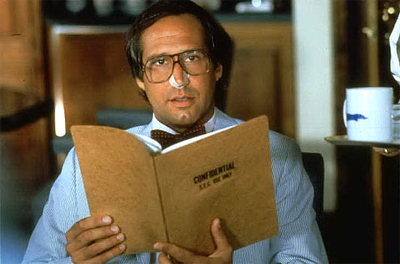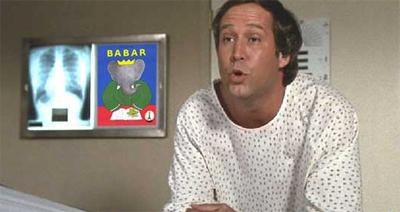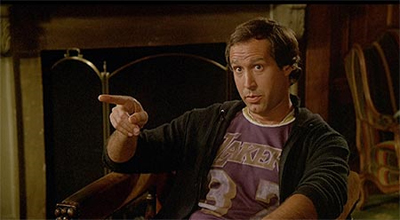Fletch has endured as something of a cult hit, offering Chevy Chase perhaps the defining role of his career and striking a chord with modern comedy talents like Bill Lawrence and Kevin Smith interested in bringing the character to modern audiences. I have to admit, after seeing the original film featuring Chevy Chase as the fast-witted quick-talking investigative journalist, that I can certainly see what the appeal of Irwin M. Fletcher.
There’s something quirky about the movie, in the way that it manages to incorporate a whole host of pulp references into a weird cocktail. The set-up could pretty much have been taken, beat-for-beat, from a classic film noir. Fletch is confronted by a hugely successful industrialist, and offered a strange proposal: $50,000 to kill this captain of industry (who claims to be facing a long a slow death due to bone cancer). Of course, things are not immediately as they appear, and Fletch begins to poke around, unearthing all sorts of shady connections.
The movie combines this pulpy atmosphere with some of the grand themes that developed out of the seventies, prompted by scandals like Watergate. Our hero is not a private detective, nor a cop, nor a gangster. He’s an investigative journalist, and he’s trying to crack a case. We’re introduced to Fletch undercover at a drug operation on the Los Angeles coast, one that nobody else seems to care about. During a police raid, we witness the incredible brutality that these drug addicts are subjected to by those in authority – and as Fletch pushes deeper into the story, he discovers that those in authority might not necessarily have clean hands.
The movie plays with the idea of the journalist as the figure who challenges traditionally unquestioned authority. Confronting Police Chief Jerry Karlin, Fletch refuses to bow to any pressure to spike his story – even though Karlin throws around excuses and justifications which we imagine authorities give all too readily. His report, we’re assured, would potentially endanger undercover cops working on the boardwalk and would jeopardise a drug investigation that has been on-going for quite a while. Of course, Fletch is too smart for any of this, but there’s a definite vibe of the post-Watergate-era mistrust of authority (at one point, Fletch is even explicitly compared to “Woodward and Bernstein” and even uses the alias “Gordon Liddy”).
Tying this mismash together, the combination of forties noir and seventies paranoia, is a healthy doubt of eighties snark and irreverence. Chase is great in the eponymous role of undercover investigative reporter, tossing out all manner of pop culture aliases like “Don Carleone” and “Harry S. Truman” that he counts on his marks not being astute enough to question or challenge. Chase has remarked in the years since that it was the role of Fletch that offered him the greatest amount of freedom – and you can see this. Fletch is cheeky, quick-witted, but still a somewhat genuine individual.
The movie is constructed as a fairly straightforward mystery. The plot develops and expands in fairly logical directions, and it all hangs together quite well. It doesn’t feel the need to throw crazy twist after crazy twist at the audience – indeed, it’s quite possible for audience to figure out what is going on long before the film lays it all out in front of us. Being honest, it’s not a spectacular plot, it’s very conventional and very typical, but it gets the job done.
The rest of the movie’s appeal does come from its lead character and actor. I honestly can’t say that I’ve ever seen Chevy Chase this good. Fletch is smart and clever, he’s the kind of guy who always has a cheeky comeback, even when he really shouldn’t. His outlandish disguises and attempts to appear incognito are consistently entertaining, while the fact he constant charging large amounts of money to the tab of an obnoxious member of the local tennis club speak to a spirit of rebellion.
It’s easy to see the cult appeal of Fletch. It’s all there in the title, and the lead. His narrations call to mind the hardboiled narration of Raymond Chandler, as filtered through a slightly more modern lens for those of us who grew up with MTV.
Filed under: Non-Review Reviews | Tagged: Bill Lawrence, Chevy Chase, Film noir, films, Fletch, Gregory Mcdonald, Investigative journalism, kevin smith, los angeles, Movies, non-review review, Raymond Chandler, review, Truman Harry S, Warner Bros |























Leave a comment